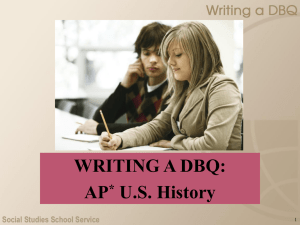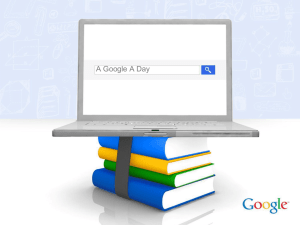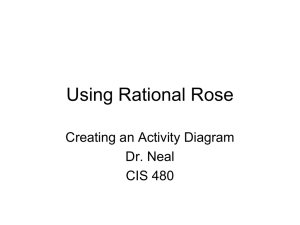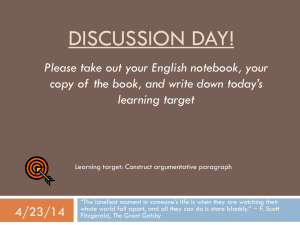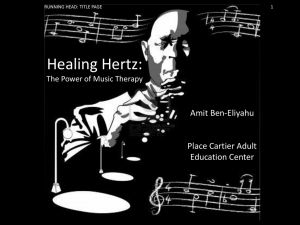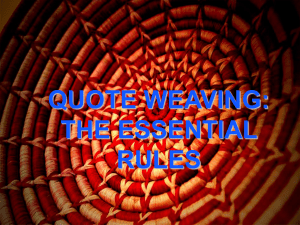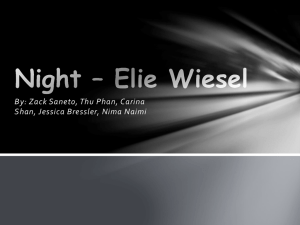Why History? - North Thurston Public Schools
advertisement
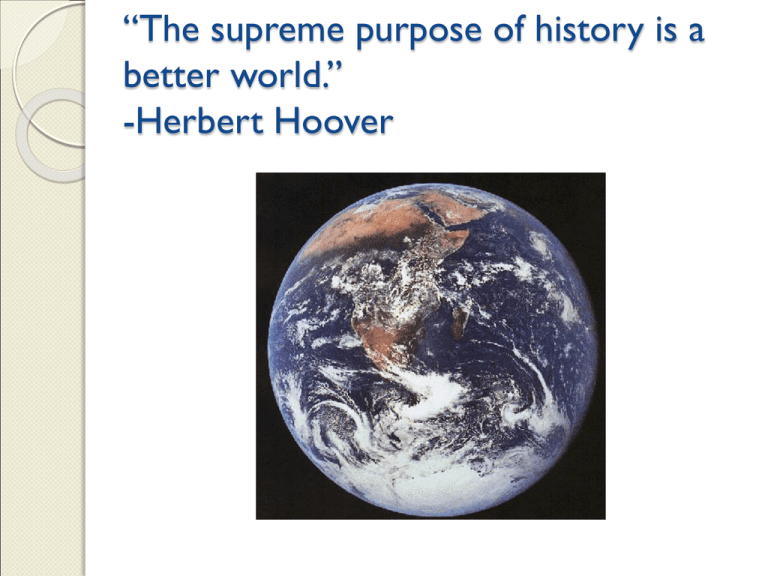
“The supreme purpose of history is a better world.” -Herbert Hoover Have you ever wondered: Why do we have to learn about history? Why do we have to go to history class year after year and learn about the past when we could be learning about what’s going on RIGHT NOW?! Many students don’t like history at all. They believe that learning about the past is totally pointless. I’m here to tell you that it’s not! Like Herbert Hoover, I believe that the study of history makes the world a better place. Today I will give you 8 reasons why we NEED this history class. But first… Let’s find out what YOU know about history. On a piece of paper titled “Why History?”, please silently write a brief paragraph in response to each of the following questions: ◦ 1) Explain one lesson or activity you’ve enjoyed in history class before. What did you like about it? What did you learn? ◦ 2)Think of one reason why we should study history in schools. Explain. Now, on your paper make a chart – Quote 1. 2. 3. 4. 5. What does this say about History? According to this quote, why should we study history? You will receive a quote – there are 11 total quotes, including yours. Quote What does this say about history? According to this quote, why should we study history? “A country without History keeps us a memory is a sane. country of madmen” – George Santanya Unless we can remember our past, we will make crazy choices. Fill in your chart with the quote I give you. Now, you will share your quote, discuss, and then the other person will write it down and fill in his/her chart. Your first partner is the person sitting next to you. Introduce yourself and share your quote. Discuss and the other person completes his/her chart Switch partners! Now the other person shares his/her quote, discuss and fill in your chart. You have 3 minutes. Do you have two rows completed on your chart? If you have the same quote as your partner, come to me for a new one! Your next partner is your sole mate. That is, someone with the same kind of shoes that you have. Repeat the process to fill in your chart! You have three minutes. Do you have three rows completed? Your next partner is the person who has the same number of pets you do. Hold up your fingers indicating the amount! You have three minutes to repeat the process. Do you have four rows completed? Your next partner is someone who is about the same height as you are. Do you have 5 rows completed? Your next partner is someone who has the same hair color that you do. One more! You will have 7 total rows completed after this one. Your final partner will be wearing the same color shirt that you have. Read over your chart. Put a star by the best reason you encountered for studying history. Put a smiley face by the quote that made the most sense to you. Put an exclamation point by the quote that you feel you had the best discussion about. Circle anything else you think is especially noteworthy. #1: History Illuminates the Present “I have but one lamp by which my feet are guided, and that is the lamp of experience. I know no way of judging the future but by the past.” ◦ Edward Gibbon “If you would understand anything, observe its beginning and its development.” ◦ Aristotle #1: History Illuminates the Present History helps us understand and survive the world we live in. Without understanding the history of issues facing us today, we will not be able to solve them. #1- Examples In order to address inequalities in the United States, we must look to our history to find out how some people ended up with so much and others with so little. In order to try and solve the conflict between Israel and Palestine today, we must first understand why they are fighting. The answer can only be found in history. #2: Skills Studying history gives us an opportunity to develop extremely important skills that will help us in all stages of our lives, no matter who we are or what we do. You don’t have to be a historian to benefit from history class! #2- Examples Evaluating the reliability and credibility of different sources, including TV, films, textbooks, etc. Thinking for yourself; formulating and depending independent thoughts. Reading, writing, research, public speaking and listening. Technology; build websites, make movies, publish magazines. Teamwork Organization and Responsibility #3: History Equals Power! “Who controls the past controls the future. Who controls the present controls the past”- George Orwell. By manipulating what people believe learn about the past, people and institutions may control what people believe and how they behave in the present. During Saddam Hussein’s rule in Iraq, students were taught that all of their nation’s wars were just and ended victoriously. ◦ How might these history lessons have impacted students in Iraq? #3: Example Thousands of Native Americans were taught the following in schools during the late 1800s: "They told us that Indian ways were bad. They said we must get ‘civilized’....It means ‘be like the white man’... And the books told how bad the Indians had been to the white men —- burning their towns and killing their women and children. But I had seen white men do that to Indians. We all wore white man's clothes and ate white man's food and went to white man's churches and spoke white man's talk. And so after a while we also began to say Indians were bad. We laughed at our own people...” ◦ How might this type of education have affected the beliefs of Native American students? ◦ Compare the two photos of the same student form the Carlisle Indian Industrial School taken three years apart. #4: Inspiration Through History Through history we find INSPIRATION in the great individuals, groups, and events of the past. Learning about this can inspire us to lead greater lives in the present. #4- Examples Martin Luther King Jr. and the Civil Rights movement Gandhi, non-violent protest and independence for India Harriett Tubman and the Underground Railroad #5: Avoiding Mistakes of the Past “History, despite its wrenching pain, cannot be unlived, but if faced with courage, need not be lived again.” ◦ Maya Angelou Through history we learn to avoid repeating the terrible mistakes of the past. #5 Examples: ◦ Slavery ◦ The Holocaust ◦ Child Labor ◦ Oppressive Government #6: Decision Making “History is the only laboratory we have in which to test the consequences of thought.” ◦ Etienne Gilson “History is a guide to navigation in perilous times.” ◦ David McCullough #6: Decision Making ◦ ◦ By examining complex questions and issues from the past, we can learn to make good decisions in the present. History is not about memorizing dates and names- it’s about learning how to THINK! In class we will: deliberate, debate, persuade, simulate, roll-play, Examples: The Cuban Missile Crisis, The Atomic Bomb, The Declaration of Independence in 1776 #7: A Common Culture History helps to provide us with a common culture, or common identity that unites us. Imagine if you woke up one morning and couldn’t remember anything about yourself. How would that make you feel? How would that affect your life? Our history provides Americans with a common bond that ties us together. In order to understand books, movies, television shows, cartoons, the news and every-day conversations in your own country, you must share in this “cultural literacy.” #7: A Common Culture “History is especially important for Americans. In many nations- Japan or Sweden, for instance- most citizens share a common background. They have a similar look. They may worship in the same church. That isn’t true of us. Some of us were once Chinese, or Italian, or Turkish, or Ethiopian. Americans don’t all look alike. Sometimes we don’t think alike. But as Americans we do share something. It is our history. We Americans share a common heritage. If you are an American, then the Indians, the Vikings, the Pilgrims, and the slaves are all your ancestors. You will want to know their stories.” Joy Hakim, historian. #8: Current Events “History is the present. That’s why every generation writes it anew.” –E.L. Doctorow Through the study of current events, history gives us the opportunity to evaluate what’s happening in our world RIGHT NOW and to make an immediate impact. #8- Examples 2012 Presidential Election Drug Trafficking The Economy The war in Afghanistan Independence in South Sudan Your Task Today… Now it is time for you to demonstrate your understanding of the importance of history. Your task is to create one advertisement, comic strip, cartoon, poem, song, or a letter to a friend of 5 or more sentences that demonstrates the importance of history. You must refer to one of the reasons we have discussed today. If you want to refer a reason we have not discussed, please consult with me. Wolf at your door? Don’t know what to do? Draw on History! Let History Illuminate your present! For only a lifetime of monthly payments of your ignorance (you don’t want that anyway!) you can 1. Tackle difficult decisions. 2. Create a Common culture. 3. Avoid the mistakes of your past. 4. And some bonus lessons come chocolate coated! Rubric The student has clearly demonstrated understanding of at least one reason why history is important ___ /10 The student has put considerable effort into the completion of this assignment ___ 10 Extra Credit: Complete a second assignment focusing on a different reason for up to three points of extra credit.


